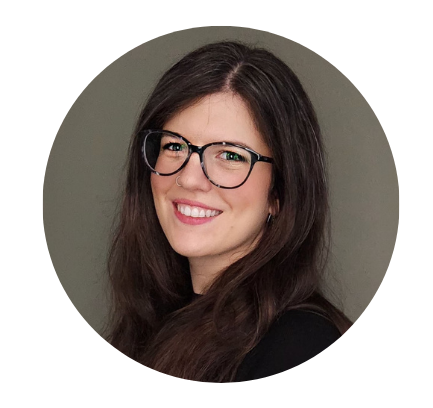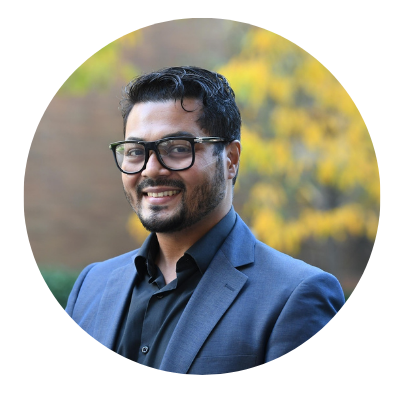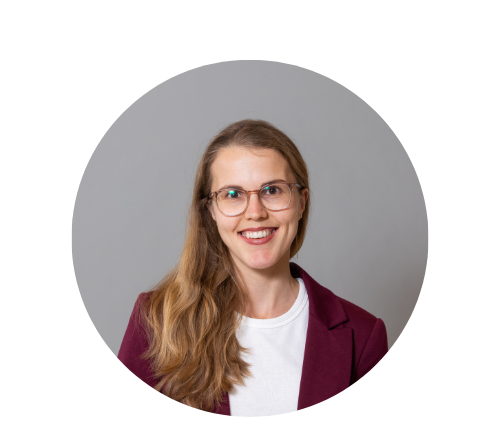Postdoc Alumni
Explore insightful interviews featuring our Postdoc Alumni, as they share their invaluable experiences of navigating their career paths.

What is your current title and institution?
I am currently working as Grant and Research Development Associate at the Vagelos College of Physicians and Surgeons (VP&S) Office for Research. My job consists of supporting and advising investigators (and postdocs!) at Columbia University on securing extramural funding for their research.
In what field did you become a postdoc, and what inspired you to become a postdoc in that field?
My postdoctoral training focused on investigating neuronal mechanisms of glucose homeostasis and food intake regulation. It is a field adjacent to that of my Ph.D. research, where I studied adipose tissue metabolism.
I think most postdocs are drawn to their area of research by big scientific questions that they want to answer – but that wasn’t the case with me. When choosing my Ph.D. and postdoc, I was inspired by the personalities, mentorship style, and passion of my mentors. I met my postdoc supervisor at a conference during the second year of my Ph.D. Of course, I was fascinated by her scientific work, but also by her critical thinking skills and energy. I thought she would be a great mentor for me. So, I noted her name, and 3 years later I joined her lab at Columbia University!
Why did you choose Columbia for a postdoc?
This is going to sound funny – but I didn’t! When I applied to join the lab of my future postdoc supervisor, she was working at another university. She transferred to Columbia right after I finished my Ph.D., and that’s how I ended up at Columbia as well.
Of course, my supervisor had very good judgment in picking the research institution for her lab, and Columbia turned out to be a great place for my postdoctoral training. At Columbia, I had the chance to interact with amazing scientists, and I had access to outstanding resources for my career development. On top of that, I found a welcoming and supportive environment among the postdoc community.
How did a postdoc at Columbia prepare you for your current role?
Columbia offers amazing resources to transition to a broad range of careers. In my case, the access to career planning tools helped me figure out what I wanted to do in my future, and exposed me to a variety of possible career paths. When I started my Postdoc, I was sure I wanted to lead my own lab in the future – but after learning about several alternative careers that one can pursue after a postdoc, I found myself more interested in scientific communication, medical affairs, and research development.
As a Columbia postdoc, I also took advantage of the one-on-one career development sessions offered by the Office for Postdoctoral Affairs, which helped me with establishing a plan for my career transition, as well as improving my resume and cover letter. I attended several courses, and I particularly valued scientific and grant writing training by the Office for Postdoctoral Affairs, the Office for Research, and the Columbia University Postdoc Society.
Additionally, the opportunities to network – both within and outside my field – have been invaluable resources for my job search.
Before transitioning to my current role, I widely discussed my aspirations and interests with the Office for Postdoctoral Affairs, and they pointed me to this career opportunity once it showed up.
What advice do you have for new postdocs as they embark on their training?
I have two main pieces of advice, which I believe apply to postdocs who plan to pursue a career in research, as well as postdocs who want to transition to a different path.
My first piece of advice is: Don’t overlook your training outside the lab. Of course, data and publications are important – but it’s equally important to have a comprehensive, diverse training for other skills you might need in the future (probably more than you think!). For example, I’m glad I took on the responsibilities of revising grants and helping colleagues to write papers. I was also happy that I got involved with the Office for Postdoctoral Affairs and the Columbia University Postdoc Society. I attended and organized a bunch of seemingly random courses and activities (ranging from a Medical Science Liaison training, to organizing happy hours and ski trips for postdocs). This wide variety of work and activities helped me to develop a broad and strong set of soft skills, which I strongly leveraged during my job search. As an example and fun fact: In the resume I used when applying for my current job, I did not even include how many papers I published or what lab techniques I know (nor I was ever asked about them!).
My second piece of advice is: Speak up for yourself. Being a postdoc is part of your training and as such, it’s a temporary position. At any step, it’s your job to learn what you want – whether that’s a promotion, less (or more) workload, or to apply for a grant or a new job – and ask for it. Even the best Principal Investigator or mentor is probably a very busy person and definitely not a mind reader. Be clear and assertive – and most importantly, proactive. You are your best advocate!

What is your current title and institution?
I am currently working as Senior Director of Research Administration at the Lung Cancer Research Foundation.
In what field did you become a postdoc, and what inspired you to become a postdoc in that field?
After graduating with a Ph.D. in cancer research/oncology, I chose to do a postdoc to mature both my scientific and interpersonal leadership skills. While there are other avenues to sharpen those skills in other career paths, as an international Ph.D. who had obtained a work visa in the U.S., a postdoc was a relatively easily attainable choice.
Why did you choose Columbia for a postdoc?
The 3 non-negotiable things I wanted in a postdoc were available at Columbia at the time I was looking. Those 3 things were:
Carrying out high-risk, high return-over-investment translational cancer research: I chose Professor Tal Danino as my mentor, as his approach of utilizing bacteria for cancer therapy, a.k.a. “bugs as drugs” fit the bill. In 5 years (2.5 years as postdoc and 2.5 years as an associate research scientist), I was able to publish 3 first author and 2 co-author peer-reviewed articles in high-impact journals, such as Nature Reviews Cancer, Journal of Thoracic Oncology, andNature Protocols. In turn, these papers helped with acquiring significant funding for future research.
Utilizing artistic approaches to help scientific communication, outreach, and hypothesis ideation: After establishing Cancer Art-Sci Network, I wanted my postdoctoral scientific research to have a component related to artistic practices. Founded in 2015, the Cancer Art-Sci Network includes cancer patients, doctors, researchers, and caregivers, and provides palliative and supportive care to approximately 200 members in approximately 17 countries in the form of art and music therapy. Proceedings of National Academy of Sciences did a feature on this – and for those interested in learning more, my paper on Nature Reviews Cancer has more information.
Living in New York City, which is unmatched for its diversity, ambition, and predisposition for art: I am a New Yorker at heart! Every day, I see millions of people who, like me, came to this city from somewhere else to turn their dreams into reality. The city provides ample amounts of networking, opportunities, support, and like-minded dreamers. In fact, to some extent, my current role at the Lung Cancer Research Foundation came to me because of the immense amount of active networking I was carrying out for the past 6 years, including what started in a small café in the East Village of New York City.
How did a postdoc at Columbia prepare you for your current role?
Doing a postdoc at Columbia was not easy. There were unforeseen burdens that I did not plan or strategize to overcome – both scientific and administrative. However, what does not break you makes you stronger! So, in the end I am glad I had the experience.
One of the nicest places here was the postdoctoral office, where Ericka, Anna, Sam, Rosa, and previous employees like Amanda were always there to help me. The second day after I landed in NYC, I came down with a terrible viral fever, and without having any family in the city or a primary physician or a referral, I tried to walk into the emergency room of several hospitals. Finally, at the verge of collapsing, I remembered that during new postdoc orientation, I had noted a phone number of the Office for Postdoctoral Affairs. I think Anna or Amanda answered my call and advised me to go to urgent care. Everyone knows about the resume, CV, mock interview preparation, and other support that the postdoctoral office provides – but that day, they literally saved my life!
Also, I will always be thankful to Elizabeth Basile at the International Students and Scholars Office. My permanent residence application was approved largely due to the excellent skill set and experience of Elizabeth! This opened up new funding and job opportunities for me.
What advice do you have for new postdocs as they embark on their training, and for those who are interested in a similar career path as you?
First, follow your dream no matter what! Gather mentors and advisors along the way, and learn from their experiences. But remember that it is your dream, and not the dream of your mentors and advisors, so take every advice with a grain of salt, and understand the underlying assumptions people make. Also, keep in mind that a linear experience of time often makes us feel like things are falling apart. And they really do sometimes. Keep your loved ones close by, so you are able to gather the energy and courage to pick up the pieces after something like that happens.
Finally, if you’re like me and you plan to be in New York City, understand the difference between “being ambitious” and “being competitive.” One of them is where you compare your present self only to your past self, and the other is where you compare yourself to everyone else. The latter one does not help in realizing our dreams. The former does!

What is your current title and organization?
My role is Regional Medical Advisor at a pharmaceutical company called Novo Nordisk. It was one of the first companies to manufacture insulin for diabetics, and that was more than 100 years ago.
As Regional Medical Advisor at Novo Nordisk, a long-standing and well-established company, I have a portfolio of pharmaceuticals from the company, and I communicate with healthcare providers and explain to them what the scientific basis is for these drugs. Healthcare providers can ask me any questions about how the drugs work. I answer their questions and inform them about the data behind them. Then I try to help them implement pharmaceutical treatment in the right settings, and make sure they can benefit from these products, so patients can have access through their healthcare providers to the pharmaceutical treatments that will help them.
After completing my postdoctoral training at Columbia, I moved back home to the Netherlands and started this Regional Medical Advisor role. My research at Columbia was preclinical in nature, but I like that my current job involves applying scientific research knowledge in a clinical setting. I also enjoy that my role involves using my communications skills to have a direct impact on patient care.
Where did you do your postdoc at Columbia?
I was at the Department of Medicine for three years for a postdoc in preclinical research. I studied cardiovascular disease mechanisms in cell culture systems and animal models.
Why did you choose Columbia for a postdoc?
I did a postdoc because I wasn’t completely sure about whether I wanted to continue in academic research after graduating from a Ph.D. program in the Netherlands. I thought a postdoc would be a nice experience to give me some extra perspective, and a good chance to go abroad and see research in a different country and at a different institution. I preferred an English-speaking country because that was easier for me. I thought the US would be a good country for my postdoc, because it would be a smoother transition for me, as I could already speak English.
I looked at a few research groups and visited with Principal Investigators (PI) at Mt. Sinai, Harvard, and Columbia. Those were PIs who I either knew from conferences, or I had heard about their research, and I had interest in their work. The PI at Columbia and their projects excited me the most. I thought the research they did was really cool, and I thought it would be a good environment for me to do research. So ultimately, I decided to join this specific group at the Department of Medicine at Columbia.
How did a postdoc at Columbia prepare you for your current role?
I enjoyed my academic research experience at Columbia, and during my time there I realized that I enjoyed doing other things besides research. I wanted to transition into a different role and have another type of challenge. At Columbia, I was able to meet a lot of different people who work in various fields, so I saw what is out there. I started to get in touch with people who worked in industry, and it was exciting to hear their stories.
At the same time, I got an email from the Office for Postdoctoral Affairs and Early Career Research (OPA) about the Medical Science Liaison course (and I had been in touch with people who had made this transition) so I thought this would be something that would fit my profile and I would really enjoy it. This course offers resources on CVs, resumes, cover letters, and clinical paper presentations for Medical Science Liaison roles. Through my network, I found more people who worked in Medical Science Liaison roles, and I set up some phone calls with them. I applied to take the course for Medical Science Liaison, which is offered through From Science To Pharma (FSTP), a partner of OPA. I made the decision to go into medical affairs after taking this course, and after the conversations I had with people.
What advice do you have for postdocs who are interested in a similar career path as you?
If you are not yet familiar with the Columbia University Postdoctoral Society (CUPS), I recommend getting familiar with them because it is a great group of people for networking. Also, CUPS has a committee that does a lot with professional development. They make connections with people in various industries, and sometimes they organize visits to learn from people at various companies.
Apart from that, just try to use your network and use LinkedIn to see who you are connected with and see if they work in a type of role that interests you. You can send them a message and see if you can talk to them. It is difficult to know how a job would be if you do not have prior experience with it, especially if your work has been primarily in a lab doing research. Talking to as many people as you can will help you get a clear picture of the role. Also, if you have an interview with a company, you can have more knowledge and excitement about what the role really entails.
What advice do you have for new postdocs as they embark on their training?
The most important things are mentorship and the atmosphere in the lab. You need to make sure that your mentor is someone who motivates and inspires you, and that you can work well with your colleagues. Those things are even more important than the research topic itself.
